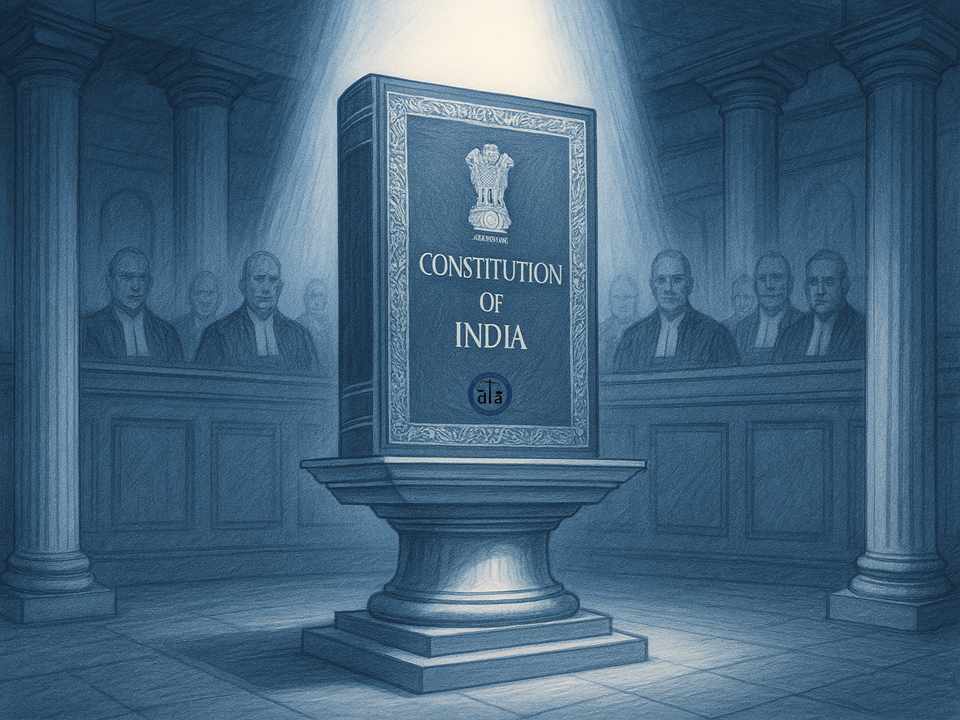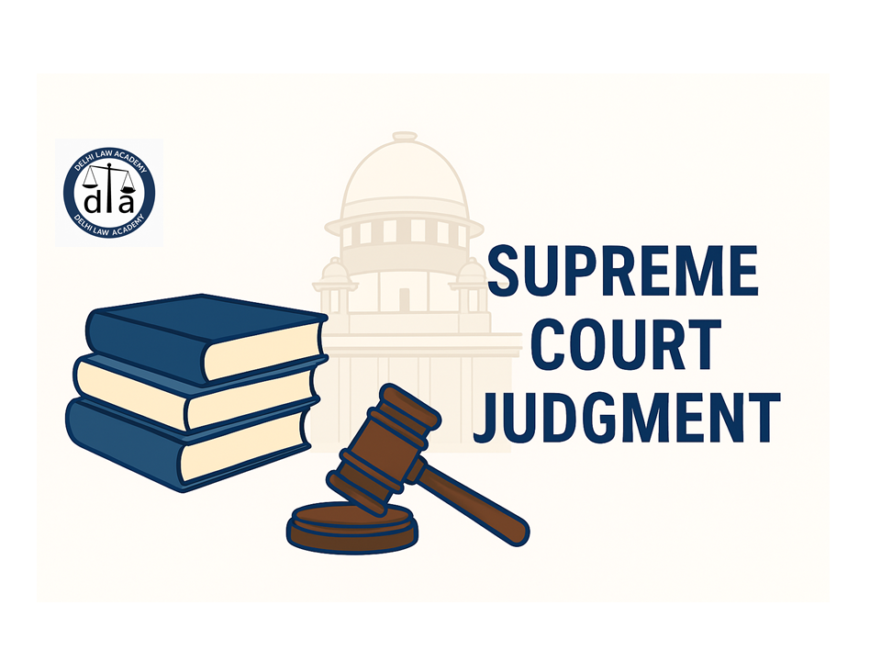
📜 Important Constitutional Amendments (77th to 106th)
Delhi Law Academy Jaipur presents below for aspirants of RJS, DJS, PCS(J) and other Judicial Services throughout India a concise compilation of all important constitutional amendments at one place; from 77th to 106th.
77th Amendment, 1995
- Inserted article 16(4A)
- Provided for reservation in promotions in govt jobs for SCs and STs
- Nullified Supreme Court ruling in Indira Sawhney case prohibiting reservation in promotions
81st Amendment, 2000
- Inserted article 16(4B)
- Empowered State to consider unfilled reserved vacancies of a year as a separate class to be filled up in succeeding years
- Such vacancies are not to be considered for 50% ceiling on reservations
82nd Amendment, 2000
- Amendment of article 335
- Provided for relaxation in qualifying marks and lowering of standards of evaluation for promotions in favour of SCs and STs
86th Amendment, 2002
- Inserted article 21A: Elementary education made a fundamental right
- Amended article 45: Provided for early childhood care and education of children upto 6 years
- A new Fundamental Duty added in article 51A: Parents or guardians to provide opportunities for education to children between 6 and 14 years of age
88th Amendment, 2003
- Inserted article 268A
- Provided for imposition of service tax
- Taxes on services are to be levied by Centre but their proceeds are to be collected and appropriated by both Centre and States on principles formulated by Parliament
89th Amendment, 2003
- Amended article 338: Provided for a National Commission for Scheduled Castes
- Inserted article 338A: Provided for a separate National Commission for Scheduled Tribes
91st Amendment, 2003
- Inserted article 75(1A): Number of ministers in Union Council of Ministers shall not exceed 15% of Lok Sabha strength
- Inserted article 75(1B): A Member of Parliament disqualified for defection shall also be disqualified to be appointed as a Minister
- Inserted article 164(1A) and 164(1B)
- Amended Tenth Schedule: Exemption from disqualification on spilt by 1/3rd members of a legislature party deleted
92nd Amendment, 2003
- Bodo, Dogri, Maithili and Santhali were included in the Eighth Schedule
93rd Amendment, 2005
- Added clause (5) to Article 15: Empowered State to make special provisions for socially and educationally backward classes or SCs or STs in admission to educational institutions, public or private, aided or unaided
- This amendment nullified SC judgment in P A Inamdar case which held that State could not impose reservation policy on unaided private colleges
97th Amendment, 2011
- Amended article 19(1)(c): Right to form co-operative societies made a Fundamental Right
- Inserted article 43B: State to promote formation and working of co-operative societies
- Inserted Part IXB: Provided for formation and working of co-operative societies
98th Amendment, 2012
- Inserted article 371J
- Provided for special provisions for Hyderabad-Karnataka region
- Provided for institutional mechanism for equitable allocation of funds to develop the region and to enhance its human resources
- Promote employment by providing for local cadres in service and reservation in educational institutions
99th Amendment, 2014
- Amended articles 124, 217 and 222
- Inserted articles 124A, 124B and 124C
- Provided for National Judicial Appointments Commission for appointment of Supreme Court and High Court judges and for transfer of High Court judges
Note: This Amendment has been struck down by the Supreme Court on 16.10.2015, as unconstitutional on the ground that it strikes at the independence of judiciary which is a basic feature of the Constitution.
📜 Important Constitutional Amendments (100th to 106th)
Delhi Law Academy Jaipur presents a concise compilation of important constitutional amendments from the 100th to 106th, crucial for RJS, DJS, PCS(J) and other Judicial Services aspirants across India.
100th Amendment, 2015
- Amended the First Schedule
- 111 Indian enclaves are transferred to Bangladesh in lieu of transfer of 51 Bangladeshi enclaves to India
Note:
- This Amendment gives effect to the India-Bangladesh Land Boundary Agreement of 1974
101st Amendment Act 2016
- Inserted article 246A
- Parliament and State Legislatures have been empowered to make laws with respect to goods and services tax
- Parliament has been empowered to make laws with respect to inter-state goods and services tax
- Deleted article 268A: This article provided for levy of Service Tax
- Inserted article 269A: Provides for apportionment of inter-state goods and services tax between the Union and the States
- Inserted article 279A: Provides for constitution of a Goods and Services Tax Council
Note:
- This Amendment introduced goods and services tax in India
102nd Amendment Act 2018
- Inserts a new Article 338B
- for establishment of a National Commission for Backward Classes
- for the socially and educationally backward classes
- to investigate and monitor the safeguards provided for these classes
- Inserts a new Article 342A to provide
- that the President may specify the socially and educationally backward classes for a State or UT
- that the Parliament may by law include in or exclude from the Central List of socially and educationally backward classes so specified
- Inserts a new Clause (26C) in Article 266 to define “socially and educationally backward classes” as the backward classes so deemed under article 342A
- Amends Clause (10) of Article 338 to exclude other backward classes from the jurisdiction of the National Commission for Scheduled Castes
Note:
- This Amendment gives constitutional status to the National Commission for Backward Classes
103rd Amendment Act 2019
- Inserted clause (6) in Article 15:
- Enables the State to make special provision for advancement of economically weaker sections of citizens
- Enables the State to make special provision for their admission to educational institutions including private educational institutions, whether aided or unaided by State
- Such reservation would be in addition to the existing reservations and subject to a maximum of 10% of total seats in each category
- Inserted clause (6) in Article 16:
- Enables the State to make reservation of appointments in favour of economically weaker sections of citizens other than classes mentioned in clause (4)
- Such reservation would be in addition to existing reservation and subject to a maximum of 10% of posts in each category
Note:
- The Constitution 103rd Amendment Act 2019 enables reservation in educational institutions and public appointments to economically weaker sections of citizens
- Received assent of the President on 12 January 2019
- Came into force on 14 January 2019
104th Amendment Act 2019
- Extends reservation to SCs and STs in Lok Sabha and State Legislative Assemblies under articles 330 and 332 for another 10 years
- Amends article 334: Reservation to SCs and STs to expire after 80 years from the commencement of the Constitution, i.e. by 25 January 2030
- Does not extend nominations in Lok Sabha and State Legislative Assemblies under articles 331 and 333 for Anglo-Indian community
- There would be no such nominations for the Anglo-Indian community beyond 25th January 2020
105th Amendment Act 2021
- Insertions in Article 342A:
- Explanation.- For the purposes of clauses (1) and (2), the expression “Central List” means the list of socially and educationally backward classes prepared and maintained by and for the Central Government.
- (3) Notwithstanding anything contained in clauses (1) and (2), every State or Union territory may, by law, prepare and maintain, for its own purposes, a list of socially and educationally backward classes, entries in which may be different from the Central List.
106th Amendment Act 2023
- Insertion of new article 330A: Reservation of seats for women in the House of the People
- Seats shall be reserved for women in the House of the People.
- As nearly as may be, one-third of the total number of seats reserved under clause (2) of article 330 shall be reserved for women belonging to the Scheduled Castes or the Scheduled Tribes.
- As nearly as may be, one-third (including the number of seats reserved for women belonging to the Scheduled Castes and the Scheduled Tribes) of the total number of seats to be filled by direct election to the House of the People shall be reserved for women.
- Insertion of new article 332A: Reservation of seats for women in the Legislative Assemblies of the States
- Seats shall be reserved for women in the Legislative Assembly of every State.
- As nearly as may be, one-third of the total number of seats reserved under clause (3) of article 332 shall be reserved for women belonging to the Scheduled Castes or the Scheduled Tribes.
- As nearly as may be, one-third (including the number of seats reserved for women belonging to the Scheduled Castes and the Scheduled Tribes) of the total number of seats to be filled by direct election in the Legislative Assembly of every State shall be reserved for women.
- Amendment of article 239AA: Reservation of seats for women in the Legislative Assembly of the NCT of Delhi
- Insertion of new article 334A: Reservation of seats for women to take effect after delimitation
- These provisions shall come into effect after an exercise of delimitation is undertaken for this purpose after the relevant figures for the first census taken after commencement of the Constitution (One Hundred and Sixth Amendment) Act, 2023 have been published
- Shall cease to have effect on the expiration of a period of fifteen years from such commencement
📚 Further Reading for Law Aspirants
Explore more useful resources from Delhi Law Academy to strengthen your preparation:
❓ FAQs
The 100th Amendment (2015) amended the First Schedule and transferred 111 Indian enclaves to Bangladesh in exchange for 51 Bangladeshi enclaves in India, giving effect to the India-Bangladesh Land Boundary Agreement of 1974.
The 101st Amendment Act 2016 introduced the Goods and Services Tax (GST), empowered Parliament and State Legislatures to make GST laws, and created articles 246A, 269A, and 279A for GST implementation and the GST Council.
The 102nd Amendment Act 2018 inserted Article 338B for establishing the NCBC and Article 342A for defining socially and educationally backward classes, giving the NCBC constitutional status.
The 103rd Amendment Act 2019 inserted clause (6) in Articles 15 and 16, enabling reservation in educational institutions and public appointments for economically weaker sections of citizens up to 10% in addition to existing reservations.
The 106th Amendment Act 2023 inserted Articles 330A, 332A, and 334A, providing for reservation of seats for women in the Lok Sabha, State Legislative Assemblies, and NCT of Delhi, to take effect after delimitation.
The 104th Amendment (2019) extended SC/ST reservation in legislatures for another 10 years but ended Anglo-Indian nominations.
The 105th Amendment (2021) clarified the Central List in Article 342A and allowed States/UTs to maintain their own lists of socially and
Contact us
📍 Delhi Law Academy – Jaipur Branch
6C, Tower 2, Coaching Hub, Pratap Nagar, Jaipur – 302033
📞 Phone:
+91 9911916552
+91 8447285606
✉️ Email:
contactus@delhilawacademy.com

